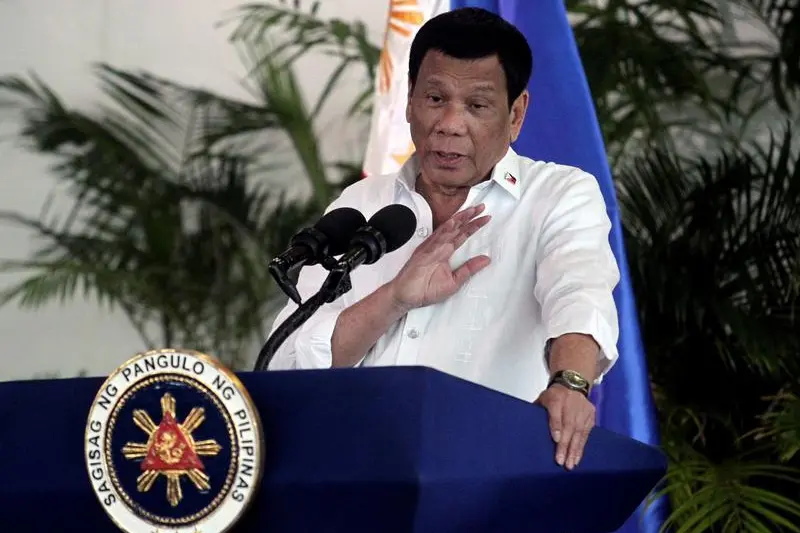PHOTO
MANILA - Paying some of Asia's highest telecom charges while suffering slow Internet and frequent dropped calls, Filipinos will expect better service once the government picks a new entrant to break a duopoly in a market worth $5.1 billion annually.
Having warned Globe Telecom and rival Smart, owned by PLDT, two years ago that he would open the door to competition unless they improved, President Rodrigo Duterte's patience ran out.
On Wednesday the government open an auction for a licence, and by the end of the year there should be a third operator in the Philippines, a lucrative market of 105 million people.
The winner will be judged on more than the size of their investment, they must also make firm commitments to providing minimum Internet speed and largest population coverage.
Studies show that the Philippines at times has led the world in sending text messages, using Facebook, and posting selfies.
Filipinos in 2017 on average spent nearly four hours daily on social media, more than any other country, according to a 2018 report by social media management firms, We Are Social and Hootsuite.
Time Magazine in 2014 named Manila's Makati City the world's "selfie" capital for having the highest volume of self-images posted on social media, and before mobile data was widely available, Filipinos were the world's biggest texters, in 2007 sending on average a billion SMS messages daily.
Adding to that, only 56 percent of Filipino mobile users connect to 3G or LTE, and over 90 percent of them are prepaid customers, and not tied to contracts.
"There's large demand in mobile space. Apart from that, wired space for connectivity via broadband to the houses, landline and cable TV is very low," said Pierre Galla, co-founder of information technology advocacy group Democracy.NET.PH.
"There's a lot of potential for growth ... that's the reason why foreign players have become interested."
A third licence will be awarded on the basis of highest committed level of service (HCLOS). Ten firms have expressed interest so far, although others can still join bids.
Among the 10 are Norway's Telenor, which operates in eight countries including Thailand, Malaysia and Myanmar, and China Telecom . Duterte has expressed a preference for a Chinese state firm, despite concerns from minority lawmakers that it presents a cybersecurity threat.
STOCKS SURGE
Domestic telecoms and Internet stocks tipped to benefit have rallied this year, like Now Corp , Easycall and Transpacific Broadband TBGI.PS , which have seen year-to-date growth as high as 609 percent, 313 percent and 211 percent respectively, compared to the broader index's .PSI biggest gain of 6 percent.
Philippine Telegraph & Telephone Corp last year told Reuters it wanted to partner with Chinese firms while Vietnam's Viettel in August confirmed to Reuters its interest in the third license.
Philippine economic ministers have also tried to court Britain's Vodafone. So far, local firms PT&T, Converge ICT and TierOne Communications have confirmed they'll submit bids.
Eliseo Rio, the acting telecoms minister and a 32-year veteran of military communications, said a new player could transform the sector in just two years with new technology, infrastructure and fixed-line services that the duopoly had little incentive to provide.
"It will really challenge them. Right now, Globe and Smart are more or less not really improving their services because of market forces," Rio told Reuters in a recent interview.
"People are very anxious to have a third telco come in."
If the experience of the two existing players is anything to go by entry into the market won't be plain sailing.
Globe and Smart say they have this year been investing in major upgrades - $950 million and $1 billion respectively - but that is impeded by a weak regulatory framework that means local governments each make up their own rules, and a small petition can halt everything.
It can take a year to put up a single telecommunications tower, of which the Philippines needs about 50,000 more to be on a par with countries like Thailand and Vietnam.
Each one needs a stack of approvals - at least 25 permits - from health, environment, transport and aviation authorities to residents, mayors, governors, and sometimes, tribal elders.
"The irony is people complain of none or weak mobile reception but want no towers built near them," said Anna Lissa Visda, a site acquisition manager for Globe.
Legal challenges are not uncommon and bureaucracy remains a problem, shown by the country's fall to 124 from 113 in the World Bank's Ease of Doing Business survey last week.
An archaic law limiting foreigners to 40 percent ownership of a telecoms operator remains, and there's no common tower policy requiring firms to share infrastructure, or any government investment or subsidies for building it. Rio said those issues are being addressed.
A spokesman for PLDT said "many barriers still stand in the way", and a "tedious" permitting process, which a Globe spokeswoman described as "circuitous" as local governments set their own rules.
Globe said it was also ready to divest its tower assets, which would support the new entrant and smaller firms, and welcomed a new player "to help foster a healthy competitive environment."
(Editing by Simon Cameron-Moore) ((manila.newsroom@tr.com; +63 2841 8983))





















